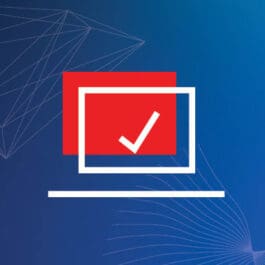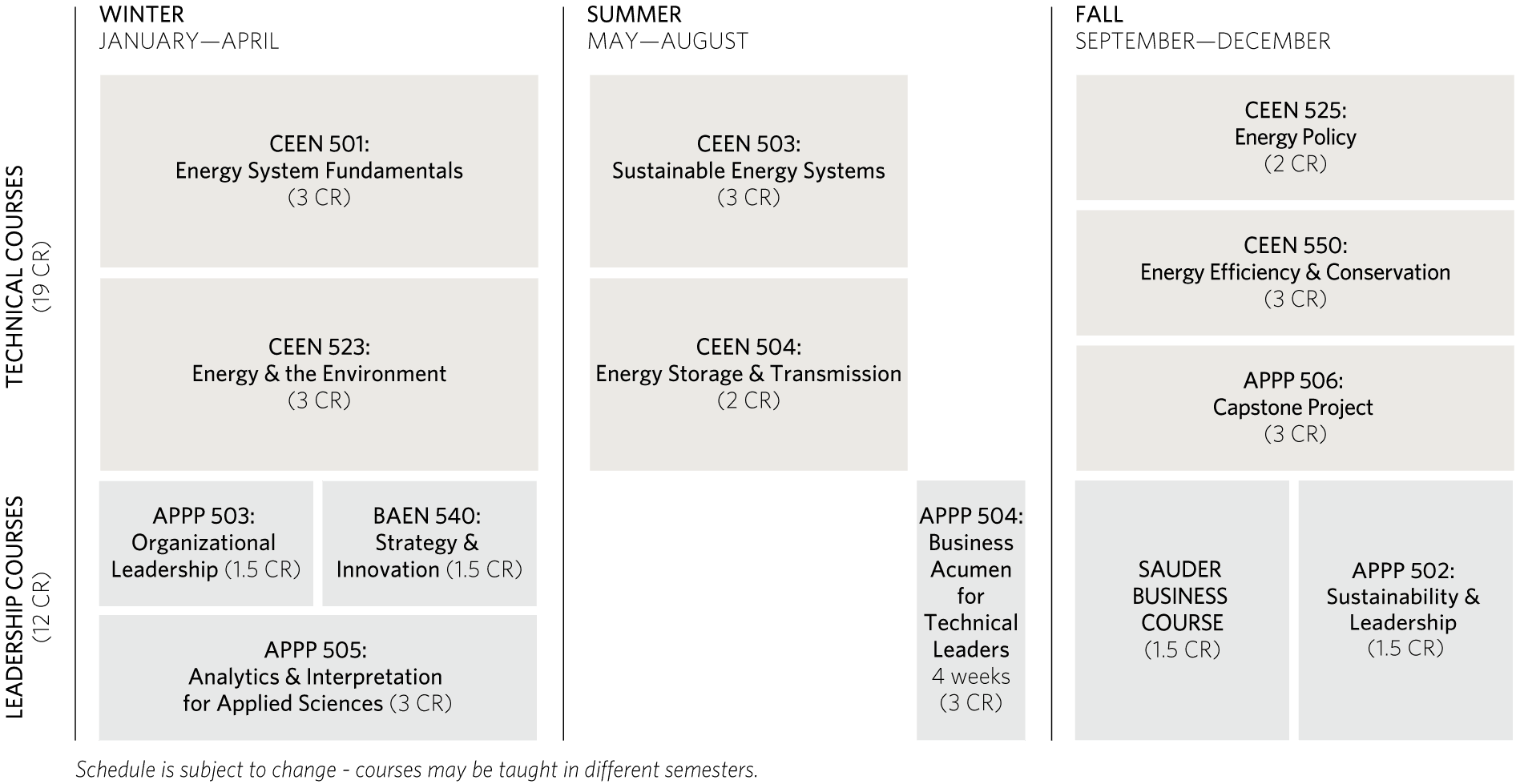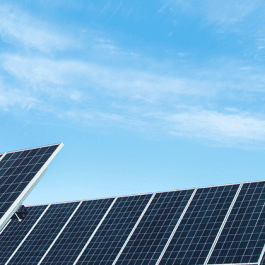
Course Information
The Master of Engineering Leadership (MEL) in Clean Energy Engineering stands at the forefront of graduate engineering education, offering a dynamic curriculum that merges technical expertise with business acumen.
Dive deep into the technical aspects of clean energy engineering with 60% of your courses delivered by the esteemed UBC Faculty of Applied Science. These courses are meticulously designed to advance your technical knowledge and prepare you for the complexities of the industry. Complementing your technical education, 40% of the curriculum is focused on business studies offered through the renowned UBC Sauder’s Robert H. Lee Graduate School. This unique blend equips you with not only technical proficiency but also the critical business skills needed in today’s market.
Our program adopts the innovative flipped classroom format. Before attending classes, you’ll immerse yourself in the course material through independent study, including assigned readings and lecture videos. This preparatory work sets the stage for a highly interactive classroom experience. Here, you’ll engage in vibrant discussions, group projects, and hands-on activities like case studies and experiments. This approach ensures a deeper understanding and application of knowledge, fostering a more enriching learning experience.
Course Overview

Winter term: January to April
CEEN 501: Energy System Fundamentals
This course will focus on the thermodynamic analysis of energy conversion processes, power cycles and refrigeration cycles, energy analysis of conventional energy systems and thermal conversion technologies. As a prerequisite, you must have completed a course in thermodynamics at the second-year level.
By the end of this course, students will be able to:
- Use thermodynamic principles for evaluating alternative energy processes and systems.
- Recognize the main processes for conversion between solid, gaseous and liquid fuels, and assess whether such conversions are likely to be advantageous under different circumstances.
- Apply thermodynamics principles to assess various applications relevant to British Columbia, such as combined heat and power cycles, methane liquefaction, and alternative electricity generation.
- Confidently deal with practical energy-related problems, and write professional reports discussing technical issues.
CEEN 523: Energy & The Environment
The course will cover energy, environment and society interactions, the development of energy resources, energy demand and its determinants, the policy dimension of energy and climate change, impacts on ecosystems, life-cycle analysis and impact assessment and other tools for quantitative and qualitative evaluation of alternative energy sources.
By the end of this course, students will be able to:
- Understand and explain the concept of sustainability, with its techno-economic, environmental and social components.
- Understand and articulate the policy implications of energy supply and use, including climate change.
- Analyse energy systems to reveal their economic, environmental and social impacts and risks.
- Apply and interpret the results of Life Cycle Assessment (LCA) to evaluate the environmental impacts of energy and other product systems.
- Understand the concept of industrial ecology and apply it in integrating systems of energy conversion, supply and use, to improve sustainability.
APPP 503: Organizational Leadership
Understand the behaviour of people and groups and how this applies to management and leadership within professional organizations. This course explores motivation, group dynamics, organizational structure, leadership styles and tools for assessing organizational effectiveness. The course is collaboratively delivered with the Faculty of Commerce and Business Administration.
By the end of this course, students will be able to:
- Apply theoretical principles of leadership and organization behaviour in a variety of organizational contexts and industries.
- Diagnose organizational behaviour and people management challenges and find solutions that deliver business results and ensure employee engagement.
- Understand what it takes to build effective manager-employee relationships, given the realities of power, motivation and commitment in an organizational setting.
- Develop and present recommendations for organizational leadership challenges using the case study analysis approach.
BAEN 540: Strategy & Innovation
This course provides an introduction to the principles and frameworks of strategic management, as well as concepts surrounding the creation or expansion of innovation capabilities, within organizations. Strategic management involves analysis, planning and execution of initiatives that achieve objectives in support of organizational goals. Innovation generally involves the development of revolutionary new or evolutionary improvements to existing ideas, methods, products, services, or combinations thereof that are adopted. The course will also consider the changing nature of organizational strategy and innovation in an environment of increasing globalization, digitization and automation. Entrepreneurship and intrapreneurship will be recurring themes throughout the course. The course will emphasize actionable lessons and models that students, regardless of their professional or academic backgrounds, can apply in practice to create tangible and valuable outcomes across organizational types, growth stages, and industries.
By the end of this course, students will be able to:
- Understand strategic decision making and organizational innovation processes.
- Analyze business situations using relevant concepts and tools.
- Understand business approaches for managing strategy and innovation programs and projects.
- Create and present plans for solutions to organizationally important challenges.
- Communicate effectively about planning and delivering on strategy and innovation.
APPP 505: Analytics & Interpretation for Applied Sciences
Professionals who can manage analytics and “big data” are highly sought after by companies across the world. This course will provide students with the opportunity to identify, interpret and utilize key analytics from real-world data sets. Graduates will feel comfortable with the latest data collection methods, measurement and presentation tools, be able to interpret data and identify trends, and understand the role of big data and predictive analytics across several different industries.
By the end of this course, students will be able to:
- Discuss data analytics and data visualization principles and methods.
- Design and develop interactive visualizations and dashboards using Tableau.
- Use advanced features and functionalities of Tableau.
- Present and communicate analysis findings to different target audiences.
- Understand how to clean and transform different kinds of data to facilitate exploration and analysis.
- List use cases for effective visual analytics.
- Recognize issues related to ethics, privacy, governance, provenance and integrity when working with data.
CEEN 503: Sustainable Energy Systems
Students will explore planetary thermodynamics, energy system evolution, the role of renewable energy sources, alternative energy technologies such as solar, wind, small-scale hydro, tidal, geothermal, and biochemical energy, electromechanical conversion processes and the techno-economic assessment of alternative energy technologies.
By the end of this course, students will be able to:
- Recognise the role and potential of renewable energy resources and alternative energy technologies.
- Apply thermodynamic principles and fundamentals of energy conversion to sustainable technologies.
- Evaluate alternative energy systems, and compare conventional thermal energy processes to alternative energy processes.
- Assess alternative energy technologies using techno-economic tools.
- Analyse contemporary issues related to renewable energy and sustainable energy technologies.
CEEN 504: Energy Storage & Transmission
This course analyzes energy transportation systems from resource extraction to energy services. It also covers the thermal, mechanical and electrochemical storage and transport components of electrical and thermal energy systems, transmission and distribution design systems, and distributed generation systems.
By the end of this course, students will be able to:
- Identify thermal energy and electrical energy storage systems and conversion.
- Evaluate technologies involving fuel cells, batteries, pumped hydro and compressed gas, among others.
- Explain and critically evaluate fuel, heat and electric power transmission and distribution.
- Recognise contemporary issues related to conversion, storage and transmission of energy and sustainable energy technologies.
- Design and apply energy storage and transmission systems that meet the demand for sustainable energy generation and application.
APPP 504: Business Acumen for Technical Leaders
An asset to the aspiring technical leader, business acumen is knowing how business works and applying that knowledge with the goal of business improvement. This course offers an elevated perspective of how technical skills contribute to building value in a business. The course immerses aspiring technical leaders in the practical application of core business skills and the development of six core business competencies, which are presented as modules: Managerial Accounting, Strategy and Performance, Market Evaluation, Operations Management, Negotiations and Contract Management and Business-Case Building and Valuation. This course is collaboratively delivered with the Faculty of Commerce and Business Administration.
By the end of this course, students will be able to:
- Apply theoretical principles of business in a variety of contexts.
- Analyze and discuss common business situations encountered by managers from multiple angles using the case study analysis approach.
- Appreciate the importance of each of the functional areas, as well as the inter-connectedness of business decision-making.
- Appreciate the importance of excellent written and oral communication skills.
- Understand the importance of effective team work and strong ethical standards in management.
- Plan and present effective and meaningful presentations.
Fall term: September to December
CEEN 525: Energy Policy
This course covers energy policy process and governance, including sustainable energy as a social and political challenge, formal government structures and process, actors in the policy, policy analysis, policy instrument and energy-planning and approval processes and environmental assessment. It will also introduce demand-side energy policy.
By the end of this course, students will be able to:
- Describe phases of the policy process and relate this understanding to contemporary and historical energy policy debates.
- Identify relevant energy policy stakeholders in the governance system, both within and outside of government, and relate this understanding to contemporary and historical energy policy debates.
- Identify strengths and limitations of different policy instruments and approaches for energy systems decarbonization, and relate this understanding to contemporary and historical energy policy debates.
- Identify enablers and barriers to clean energy transitions from socio-economic, political, and environmental perspectives, for different regional contexts around the globe.
- Evaluate existing and proposed energy policies, and their outcomes, from multiple stakeholder viewpoints.
- Articulate goals and outcomes of energy policy in plain language to stakeholders, often with diverse values, needs and world-views.
- Collaborate in teams to analyze real-world energy policy cases.
- Develop and articulate a personal vision of how engineers and scientists can engage in energy policy debates.
CEEN 550: Energy Efficiency & Conservation
The course will focus on the engineering concepts of demand side management (DSM), including energy auditing, analysis of buildings, industrial equipment, measurement and verification and system data analysis. The course also covers energy-efficient technologies for green buildings and industrial processes, behaviour and energy use and DSM policy concepts.
By the end of this course, students will be able to:
- Apply concepts of energy efficiency and conservation with an emphasis on the demand side management (DSM) and energy engineering.
- Apply monitoring, targeting and reporting methods in energy management.
- Identify and address potential problems related to energy efficiency and conservation in residential, commercial and industrial applications.
- Demonstrate energy efficiency methods in green building design.
- Identify non-technical EE&C interrelated concepts such as policy, economic and management issues, as well as behavior.
APPP 506: Capstone Project
A capstone design project gives students experience in leading complex multidisciplinary projects relevant to their professional specialization. This course is collaboratively delivered with the Faculty of Commerce and Business Administration.
By the end of this course, students will be able to:
- Develop a project proposal with specific goals and objectives.
- Write a professional report based on the technical analysis of a complex clean energy system.
- Evaluate economic viability of a clean energy related project.
- Professionally communicate the key findings of a project both orally and in a written format.
- Apply the technical and business knowledge you acquired in your MEL program on a real-world problem.
- Build and/or extend your professional network by interacting with your industry mentor(s).
- Get insights into the Canadian working environment and action plans on climate change at the provincial and federal levels.
UBC Sauder School of Business Courses
Students can choose a UBC Sauder Business Course to gain greater exposure to a particular area of interest. Options include (subject to change):
BASC 550: Operations and Logistics
This course will introduce students to the key concepts and tools needed to understand and effectively manage supply chains and business operations in general. A key concept in this course is the “business process”, and managing and improving such processes.
BAMA 519: Building Brand with Purpose
This course explores the core principles of branding within the context of social and environmental responsibility including healthcare, sustainability and human rights. Fundamental marketing strategies are reinforced as they relate specifically to: 1) non-profits, 2) social marketing designed to change society’s behaviour and 3) cause-related-marketing within thecorporate sector.
BA 563: Decision Making for Managers
This course is designed to make you a better decision maker by helping you understand your weaknesses and build on your strengths in decision-making. This is an integrative course that links material from Economics, Operations, Statistics, Marketing, Psychology, Finance, and Strategy.
*Course offering subject to change.
BAEN 580B: Special Topics in Business: Creative Destruction Lab
The Creative Destruction Lab Venture Program is a 3-credit course in entrepreneurship in which students will work with the Creative Destruction Lab West (CDL-West) team to help emerging technology and science focused start-ups. Students will become familiar with the CDL-West companies and will have the opportunity to support with market analysis, customer development, financial analysis, and other core activities related to building early stage start-ups. Students will be provided with visibility into how venture capitalists and angel investors make investment decisions.
APPP 502: Sustainability & Leadership
This course helps students build skills to lead change that influences the triple bottom line and explores concepts related to sustainability, change agency systems thinking, awareness and perspective for engagement and communication, adaptive leadership, and change dynamics. It also incorporates case studies in organizational and social change. This course is collaboratively delivered with the Faculty of Commerce and Business Administration.
By the end of this course, students will be able to:
- Recognize tools, concepts, standards and frameworks used in sustainable business.
- Analyze current realities, market opportunities and issues related to sustainability across a range of industries.
- Integrate sustainability-related concepts into their own industry and/or personal experiences.
- Synthesize, apply and communicate sustainability knowledge to one’s peers.
- Apply various leadership concepts and tools into their professional practice, and in particular to sustainability-related initiatives.
Application Deadlines
The online application portal for the January 2025 intake is now open!
Applications are due June 25, 2024.
How to ApplyJoin us for an
Info Session
Sign up for our latest online information sessions and discover what our programs have to offer.
Sign Up NowApplicant Guide
Navigate the application process with ease!
Sign up to receive tailored instructions and a detailed guide directly to your email.
Sign upFeatured Faculty and Staff


